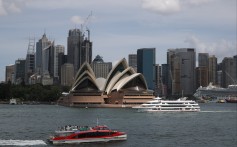Uncertainty clouds Chinese millionaires who chased Australia’s golden visas: ‘Our life is a mess’
- Many wealthy migrants are staring at a bleak future after the government put the visa scheme on the back burner, causing processing times to blow out
- ‘The forever wait means that even if I’m running my business at a loss, I cannot just close shop and move on,’ says an investor
Australia+ FOLLOW

Reuters
+ FOLLOW
Published: 9:13am, 16 Jun, 2023
Why you can trust SCMP
6

The delays have raised concern that Australia might scrap the golden visa programme. Photo: Reuters
In 2018 Paul Wang left his home in Beijing to start a new life in Australia, investing A$1 million (US$680,000) in a food processing business in the hopes of qualifying for permanent residency under the country’s investment visa scheme.
Five years on, his hopes for his family of three remain on hold as the government has put the controversial “golden visa” programme on the back burner, causing processing times to blow out, leaving wealthy migrants like Wang in limbo.
“We were not expecting it would take this long,” said Wang, 44. “And our life is a mess because of that. We simply cannot plan ahead with all of the uncertainty.”
When Australia introduced the Business Innovation and Investment Programme (BIIP) in 2012, the hope was that wealthy business owners, investors and entrepreneurs would boost the economy by bringing in capital and driving innovation.
The results, though, have been underwhelming. A government review published in March found BIIP migrants contributed less to the economy than the average Australian, as the cohort, despite their wealth, tended to be older and earned lower incomes through capital returns on passive investments.
Australia to retain top talent, cut ‘worker exploitation’ in immigration reform
27 Apr 2023

The review estimated the lifetime economic contribution of BIIP holders at A$600,000, less than half the A$1.6 million of Australians.After coming to power 13 months ago, Australia’s Labor government shifted priority to easing shortages of critical skilled workers. Partly as a result, most BIIP permanent visas are taking nearly three years to process, up from a previous average around 12 months, and in addition to an investment cycle of four to five years.
Wang has been waiting 21 months.
EVERY SATURDAY
A weekly curated round-up of social, political and economic stories from China and how they impact the world.
GET THE NEWSLETTER
By registering, you agree to our T&C and Privacy Policy
Similar investment visa schemes have been scrapped in Canada, Britain and Singapore as governments conclude they do not create jobs and could be a means to park speculative money.
00:09 / 00:30
Australian government orders review of Chinese-made surveillance cameras in defence offices
Every category of Australian visas experienced a backlog during Covid-19. As the pandemic has eased, the government has cut processing times overall, but the wait for more than 3,000 BIIP holders and their families – many Chinese – has only lengthened.Some BIIP applicants plan to protest in Sydney on Friday against the government’s policy shift, a rarity as Chinese migrants largely avoid public dissent.
Asked about the visa delays, the Department of Home Affairs said in an emailed statement the government would process all visas in line with priority and planning levels, declining to comment on the complaints from BIIP holders.
It said a new migration strategy would be released later this year, which would include “radically reshaping” the BIIP programme.
The forever wait means that even if I’m running my business at a loss, I cannot just close shop and move onTan, Chinese investor
The delays have raised concern that the government might scrap the BIIP programme, said Tony Le Nevez, managing director at residence and citizenship planners Henley & Partners Australia, whose clients have invested at least A$5 million each in the country.
“I just don’t think the investor programme is on their radar at the moment – they might overhaul it down the track. In the meantime, I think they might just keep a small window open.”
The government plans to shrink its BIIP allocation from 5,000 visas last financial year to 1,900 this year – less than 20 per cent of the level of earlier years.
BIIP holders say they are curtailing business investment given the uncertainty, postponing life decisions and in some cases selling properties in Australia.
Asian-Australians fear ‘Red Alert’ warmongering will fuel rise in racist hate
19 Mar 2023

Some say they must hold on to loss-making businesses to keep their visa prospects alive, missing out on investments with greater returns.“The forever wait means that even if I’m running my business at a loss, I cannot just close shop and move on,” said Tan, a Chinese investor who owns a furniture shop in Melbourne and asked to be identified only by his surname due to privacy concerns. He has been waiting for 33 months.
Wang, who gave up on plans last year to buy more land for his factory because of the uncertainty of his visa status, said he was prepared to offload his assets in Australia and move to the United States for his daughter’s education next year.
“I know a lot of people won’t sympathise with us – we’re a small group of people,” Wang said. “But we’re not being treated fairly.”
